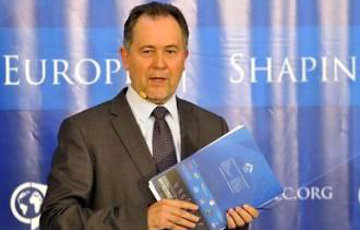Pavol Demes: Slovakia Elections Became Big Surprise Across-The-Board
- 7.03.2016, 12:50
- 5,033

PHOTO: BELARUSPARTISAN.ORG
Their results do not exclude the two extreme alternatives: the formation of a non-party “government professionals” or new elections.
The former Minister of Foreign Affairs of Slovakia, a member of the German Marshall Fund of the USA, a well-known political and public figure, Pavol Demes stated that in an interview to charter97.org.
– According to exit polls, the ruling Slovakian party has won almost 30 percent of the votes, but it is not able to form a majority in parliament. How would you comment on the preliminary results of the voting?
– The results of the elections in Slovakia have become a big surprise for everyone: for politicians and analysts. Nobody expected the elections to determine a clear winner, but it is still not certain whether Slovakia will have a stable government.
It is a very difficult situation for the country, because starting from the second half of the year, Slovakia is to preside over the European Union. Citizens feel that the presence of a stable government in Slovakia is important not only for the country, but also for the dynamics of European development.
Now there is a debate in political circles about what kind of coalition there will be in the new parliament, because the winning politicians preclude the possibility of consolidating with each other. The leaders of the winning parties, starting at noon, have been making statements about what kind of government should be formed.
Today is not yet possible to shut out any radical alternative to the coalition government, for example, that the government will be formed with officials, and not with party representatives. There is another extreme alternative – new elections, in case party leaders cannot agree among themselves.
This is what concerns the whole situation.
Many ordinary voters have been shocked by the success of Marian Kotlebya’s right-wing party, which got more than 8% of votes. The fact that the ultranationalist party is getting into the Parliament with such an overwhelming result has become a great surprise for many people. For example, the Christian Democratic Movement, which is the oldest in the Slovakian party system, with a 26-year-old political tradition, did not overcome the 5% threshold required for election to the Parliament.
All these results have made the situation difficult to predict.
– Is there a possibility for Marian Kotleba’s party to enter a coalition with the parties, capable of forming a parliamentary majority?
– Definitely not. The coalition with the party of this kind is impossible in the Slovakian Parliament. It's just out of question.
– How could the election results affect the foreign policy of Slovakia and the situation in the region?
– First, as I have said, it is still unclear whether Slovakia will get a new government or new elections will be scheduled. In these conditions it is very difficult to speculate what changes may occur in the Slovakian politics.
We can say for sure that of all the parties that have overcome the 5% barrier, there is only one radical party, which completely rejects the idea of the European Union and opposes NATO membership for Slovakia. Only Kotleba’s party has such a program. The other parties are of pro-European orientation with different accents. Therefore, we can say that the pro-European bloc of parties won in Slovakia.
The disagreement in the program and policy of the parties does not relate to the country's foreign policy. The possible issues for disagreement for the leaders of the parties included in the Parliament might be the matters of domestic policy only.
– Fico’s Party, which, according to opinion polls, won the majority of the votes, has used anti-immigration rhetoric in its election campaign. Will this lead to changes in immigration policy in Slovakia?
– The issue of migration policy could not be critically important in the elections: it is not a major problem for Slovakia, because we do not have migrants. I think that Robert Fico’s
And in this way this topic had an impact on the voters’ mood, as well as the issue of corruption and other topics related to the budget expenditure, vied at this specific angle.
I think that the theme of migration in itself will not affect the work of the Parliament and will not cause serious contradictions among the leaders of the winning parties to put the agreement on a coalition at risk.









